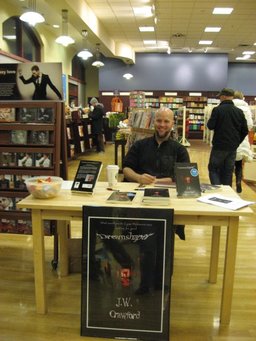|
We have a treat for you today, on this week's #WritingStrong blog! Guest author Jericho "J.S." Wayne has invited us into his world of character conversations! Thanks for joining us on FauphTalk Fiction!
_________________________________________________________________ When I started writing, I had no idea characters could be so damned stubborn. I’d have a great, grand Evil Scheme all cued up and ready to go… “Wait. No! Stop! Where are you going?!?” “Dude. Your plan’s lame and boring. I want to go here and do this instead.” “But…my plan! What about my outline?” “Don’t go all Kanye West on me, Felicia. We can get back to your lame-ass plan if you really, really insist after we check out the really cool, sick, intelligent thing I’m doing over here.” “Okay, look. We can negotiate. You be a good character and do the thing I need you to be doing now, and then we can take that side trip and you can do whatever the hell you like. Cool?” “Nah, Mr. Wayne, you got that whole thing exactly backward. You see, we can either do this my way, or I can fuck off and sit in a corner making funny faces at you while your deadline ticks closer until you get on board or magick up some super-special extra-cool way of breaking the impasse. Is that what you want?” “You’re such a dick. You do realize I’m the writer, right? I mean, you KNOW I can erase you, everything and everyone you’ve ever known, loved or cared about, your entire world and your whole shitty universe in a few dozen keystrokes, right?” “How very Old Testament of you. ‘My creations are making me mad, so I’m going to burn the whole sonofabitch down and start all over.’” “In all fairness, you’re not giving me very many options here. I have an outline, see? This, right here. ‘Main character goes to the watchtower to talk to the Head Warden about 2SC’s disappearance.’ There’s a plan. We call it a plan because you’re supposed to STICK to it.” “Yawn. How tedious. The Head Warden knows exactly fuck-all, and you and I both know it. You’re just wearing out my boots and running me all over this stupid town to screw with readers’ heads. I can go to the tavern, ask the goblin behind the bar what she knows, have a couple of pints and be way more likely to find out what I need to know. Besides, the Head Warden is probably already there.” “No, he isn’t. I KNOW he isn’t because I literally just left him writing a lengthy parchment report to Queen Yseult about the rash of manure wagons mysteriously tipping over and the sudden upswing in the number of nobles found choked to death on cowshit.” “Heh. Yeah. That was a good one. And those nobles totally had it coming, Boss. Still, I say the tavern is a better idea. Hey! Think you can write in a nymph stripper?” “No! I’m not writing in a nymph stripper just because you don’t want to do your job and would rather ogle tits.” “So how come you get to look at tits at will and I have to go see the Head Warden?” “Grrrrraaaaaagh! Because I’M. THE. WRI. TER. WRITER. As far as you’re concerned, I’m God and you do what I say you do!” “But you have to admit, this book’s getting kinda grim. A nymph stripper or two would really liven things up—” “Ask me about a nymph stripper again. I dare you.” “And what happens then?” “I’ll write in a troll. In a studded leather banana hammock. Who thinks YOU look like just his type and doesn’t handle rejection well, get my drift?” “Gulp…Um. S—s—so, hey, I hear the Head Warden might know something.” “Stop looking so pale and focus. I only said that as an illustration of why fucking with me is a poor long-term survival strategy. He may know, or he may not. But YOU won’t know unless you get your ass to the watchtower and find out. Savvy?” “So—if I do this thing, then can I go to the tavern?” “Yeah. Talk to the Head Warden and then you can go to the tavern.” “Will there be a str—um, yeah. I hear that look on your face loud and clear. Going, see? Going, going, gone.” “Asshole,” I mutter. ________________________________________________________________________ Born in Amarillo, Texas, Jericho “J.S.” Wayne has lived, worked, and traveled in approximately three quarters of the North American continent, amassing a résumé which could kindly be described as “eclectic” along the way. Currently he lives in Portland, Oregon and feels no particular urge to be anywhere else. An author in multiple genres, a misanthropic humanitarian and cynical optimist, J.S. spends most of his time when not writing erotic romance turning words into money as a website designer, SEO/SEM consultant and article and blog writer, filling the balance of his hours as a polyamorous kink practitioner and educator. He is fascinated by the use of language, human sexuality, occultism, quantum physics and trying to figure out just what the hell the lyrics to “I Am the Walrus” actually mean. He enjoys receiving mail and comments from his fans, and invites you to follow him on Twitter or simply email him at [email protected]!
4 Comments
For the longest time, I struggled through my writing, trying to force the characters into uncomfortable situations, and thrusting unnatural roles upon them. In the planning stage of my writing, I concocted a set plan that needed to happen. Although I expected elements of the story to change, that was reserved strictly for the setting and plot points, not characters.
Meanwhile, my characters were SCREAMING at me from the pages, begging me to set them free and allow them to set their own paths, or create their own stories. At first, I didn't hear them. Then I ignored them. When their voices started to cry out, I rejected them. After all, I was the writer, they were my subjects. Basically, they were my written slaves, and their lives were mine to control. Meanwhile, I still struggled. The big reveals didn't seem to be revealing very well. Confrontations were static and forced. Major events felt wrong. And I kept rinsing with the same author wash, determined that if I did, eventually these characters would smell a little better. But they didn't. They stunk. In some cases, they stunk badly. Finally, one of my character went on strike. Some of you refer to it as a writer's block, but for me, it was one of my protagonists going on strike. She was trying to tell me that no, she WASN'T a protagonist, but was actually a villain, and not just any villain, but the main cheese...the big baddie...the number one player in the end game of the story. Stumped, and with nowhere to go as long as she was on strike, I finally sat down and listened. And boy, did she set me straight. The next time I sat at my desk, I let her do her thing. Lo and behold, my fingers started dancing across the keyboard again, and the gentle, relaxing ticking of the keys once again filled my space. That moment, when my character dropped her picket sign and rejoined my book, I realized one thing. It is not my story, it's the story of my characters. It didn't matter how planned out my book was, if the characters didn't agree with the direction things were going, then things were only going to go in one direction: down. When writing, one of the most important things you can do is listen to the characters you've created. They are wise, and most of the time they know what they want to do. If you let them loose, you may just find that they come alive again, and in ways you didn't expect. Their passion will shine through in your words, and your story will once again find that flow that every writer dreams of. When your characters go on strike, as often they will, sit down with them. Let them air their grievances, and don't just nod and smile. Listen to them. In the end, it may be your story, but it's their world, and nobody understands that quite like they do. Happy writing, my friends! #WritingStrong **We here at FauphTalk Fiction wanted to take a quick moment to pass along our thanks to the #WolfPackAuthors for their support over these past few days! Building up the numbers on social media is important, and the pack has been working hard to support each other! Big thanks to the Alpha of the pack, Jeff DeMarco. Keep on howling, everyone! -FTF When I received my first copy of Dreamshaper, back in 2009, I was absolutely beside myself. As I held the book up and stared lovingly at the cover, finally seeing my work come to life as a finished product, I'm not ashamed to admit that I shed a few tears.
Over the next few months, the real work began. Marketing, promoting, trying my best to not read my own work, because all I could see was everything that I should have done to make the story even better (we've all done this, haven't we?)...the journey was just beginning. The first step towards selling my book was something I had always dreamed about. My first author's signing table. It was glorious. I still remember the day. I walked in Chapters in St. Albert, Alberta, Canada, and found a table sitting there, waiting for me. Stacks of books were piled on the table, brought in by the bookstore just for me. Family came, friends stopped by, employees smiled politely as they tried to avoid being pulled into yet another conversation by an aspiring author...it was everything I wanted. More than anything, however, I remember one conversation I had, with the assistant manager of the store. This man wasn't an author, but his insight changed everything I had planned to do in an instant. As I sat at the table, flashing my book in everyone's face, he came over to say hello, and asked how things were going. 1-2 copies had left my table in the first hour I was there, which was great, but not the success I had hoped for. I told him it was a bit slow, and he nodded. He had been watching me, and wanted to offer some helpful advice. I listened eagerly. Here is what he told me: There are 3 types of authors that hold book signings. 1) Authors who think their work alone should be interesting enough to grab people's attention. These authors have a tendency to have a table full of books, posters, and a magnificent set-up, and then they sit at the table, waiting for people to come to them. They don't talk to people who don't seem interested, but feel that people who are interested will come there way. 2) Authors who shove their work down everyone's throats. These folks are over-sellers. Every passing person suddenly has a book cover flashed in front of them, or waved in their face. Every conversation they try to start is about their book as they try and sell it to absolutely everyone. This is where I was sliding into. 3) Authors who connect. Authors who engage people in daily conversation, asking how they're doing, learning about their potential customer's stories rather than just pitching their own. As soon as the Assistant Manager laid this framework down, I knew what I was doing wrong. You see, being an author is awesome and rewarding. It's a magnificent feeling. But just because you wrote a book, it doesn't mean everyone wants to hear about it. Most customers, when walking through a bookstore, have a general idea of what they came there for. They want to quietly and peacefully browse the store, coffee in hand, and explore worlds in their own minds. Shoving your world into their faces is a turn off. We've all experience the irritating and awkward push from sales tables in malls and shopping centers. People throwing soap at you, or driving little remote control cars into your feet. If you're like me, you've awkwardly faked a phone call to avoid talking to those folks, because you didn't want to reject their advance. Instead, I started making simple conversation. I asked people about their day. I asked what they liked to read. I asked how their families were. In short, I guided the conversation onto them. As I did so, I found conversations starting to erupt regularly. And the more people wanted to talk to me, the more curious they became about the books sitting at my table. I became part of the world they were exploring, rather than just an annoying voice crying out from the side. On average, the Assistant Manager told me that authors at tables in that store sold between 5-10 books during their signings. By the end of my first signing, after changing my tactics, I had sold 12 copies. The next signing, I started right off the bat. I made the conversations focus first on my potential readers, and gradually let it turn naturally towards my work. Some of my conversations last one minute, some lasted 10-15 minutes. Most importantly, books were leaving my table. 15 books left my table. On my third signing, 23 books walked away from me. On this day, a gentlemen who was part of a motorcycle gang walked away with my book. A boxer walked away with my book. To give you some perspective on why that rocked my world, Dreamshaper is a Middle Grade adventure novel. Not the type you would normally see in the hands of Bikers and Boxers. That encouraged my next challenge: Every signing, I wanted to sell my book to one person that looked like they had no business buying a kids' book. I wasn't always successful, but more often than not I managed to accomplish this task. Since I shifted my approach, Dreamshaper did moderately well. While it didn't sell thousands on their own, table signings went very well, libraries were bringing it in, school teachers were inviting me into their classrooms. And, most importantly, I was having fun. Long story short, the best thing I learned about successful book signings came down to one simple idea. The reader is ALWAYS more important than the book. And when you make them feel that way, your book will start to walk. At it's peak, Dreamshaper cracked the top 20 shelf for one of the busiest stores in Canada, situated at the heart of Canada's biggest mall, West Edmonton Mall. If you can "buy" the reader, you can sell your book. Happy writing, everyone. Thanks for reading. J.W. #WritingStrong |
FauphTalkReal words for writers. Join us in our weekly blog! Archives
October 2018
Categories |
|
© COPYRIGHT 2018. ALL RIGHTS RESERVED.
|




 RSS Feed
RSS Feed